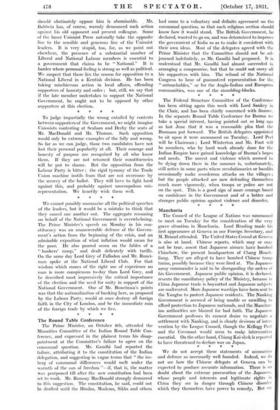The Round Table Conference The Prime Minister, on October 8th,
attended the Minorities Committee of the Indian Round Table Con- ference, and expressed in the plainest terms his disap- pointment at the Committee's failure to agree on the communal question. Mr. Gandhi had reported the failure, attributing it to the constitution of the Indian delegation, and suggesting in vague terms that " the ice- berg of communal differences would melt under the warmth of the sun of freedom "—if, that is, the matter was postponed till after the new constitution had been set to work. Mr. Ramsay MacDonald strongly demurred to this suggestion. The constitution, he said, could not be drafted until the Hindus, Moslems, Sikhs and others had come to a voluntary and definite agreement on the communal question, so that each religious section should know how it would stand. The British Government, lie declared, wanted to-go on, and was determined to improve the goVernnient of India so as to make it consistent with their own ideas. Most of the delegates agreed with the Prime Minister that the Committee should not be ad- journed indefinitely, as Mr. Gandhi had proposed. It is understood that Mr. Gandhi had almost succeeded in arranging a compromise, but that he could not carry all his supporters with him. . The refusal-of the National Congress to hear of guaranteed- representation for . the, `..` untouchables," or for the Anglo-Indian and- European communities, was one of . the stumbling-blocks. • '






































 Previous page
Previous page